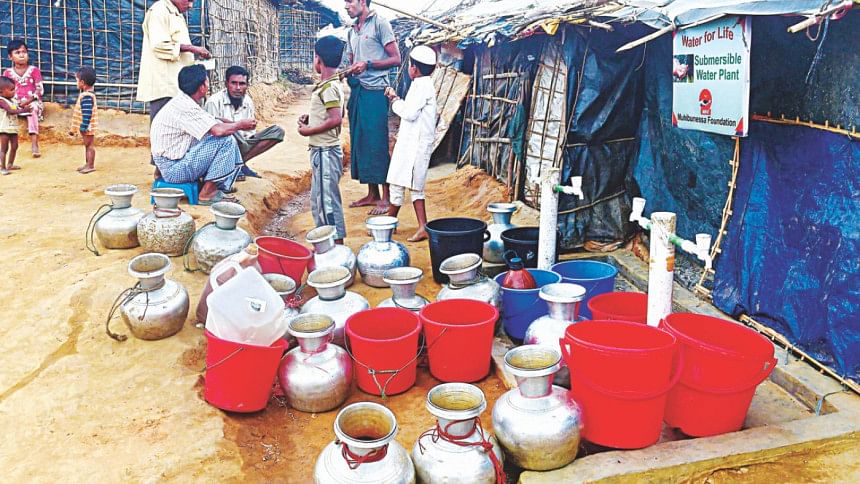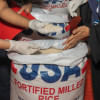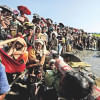Rohingya crisis : Ensure quick, safe return

UN agencies, the European Union and human rights bodies have urged Myanmar to implement the new deal on repatriation of the Rohingyas who have taken shelter in Bangladesh to escape persecution in Rakhine State.
Voicing concern over the security of the refugees, they also asked the Myanmar government to ensure a safe environment and give protection to its forcibly displaced nationals for their voluntary and safe return to their homeland.
The call came yesterday, a day after Dhaka and Naypyitaw signed the Arrangement on Return of Displaced Persons from Rakhine State, which aims to start the process of repatriation of the Rohingyas in two months.
EU High Representative Federica Mogherini yesterday termed the signing of the repatriation deal an important and welcome step towards addressing "one of the worst humanitarian and human rights crisis of our times".
"We now expect the agreement signed Thursday to be implemented without delay, and Myanmar to create the conditions on the ground that will allow for a voluntary, safe and dignified return of the refugees to their places of origin."
The European Union will monitor its implementation in full compliance with the international law, she said in a statement.
The EU also reiterated its call for full and unconditional humanitarian access to the affected areas without any delay.
Mogherini further said the EU is ready to help find a sustainable solution to the Rohingya crisis and is ready to further support the two countries in this process.
The EU top diplomat also pointed out that they look forward to the swift implementation of the recommendations of the Kofi Annan-led Advisory Commission on Rakhine State.
China has also welcomed the deal on repatriation, and said it "feels gratified at the current positive progress that has been achieved", reports Reuters.
Chinese Foreign Ministry spokesman Geng Shuang told reporters yesterday that the situation in Rakhine "has obviously been alleviated".
Rights groups, however, have voiced concern over the repatriation process, saying it was not clear where the persecuted minority will be resettled, or how their safety will be ensured.
Some aid workers fear the refugees could be forcibly interned.
Amnesty International, a London-based human rights organisation, has said the UN and the international community "have been completely sidelined" and the talk of return is "premature" while the flow of Rohingya refugees to Bangladesh continues.
Speaking at a press briefing in Geneva yesterday, UNHCR spokesperson Adrian Edwards said, "At present, conditions in Myanmar's Rakhine State are not in place to enable safe and sustainable returns. Refugees are still fleeing, and many have suffered violence, rape and deep psychological harm. Some have witnessed the deaths of family members and friends."
He also said most of the Rohingyas have little or nothing to go back to as their homes and villages were destroyed.
"Deep divisions between communities remain unaddressed. And humanitarian access in northern Rakhine State remains negligible."
He said the UN Refugee Agency has not yet seen the details of the deal.
The UNHCR looks forward to seeing details of the deal between the two countries, and stands ready to help both governments work towards a solution that meets international refugee and human rights standards, he mentioned.
Edwards further said the refugees have the right to return and the UNHCR will welcome a framework that enables them to exercise this right in line with the international standards.
"First and foremost, this means that return must be voluntary, and take place in safe and dignified conditions that pave the way for lasting solutions."
It is critical that returns do not take place precipitously or prematurely, without the informed consent of refugees or the basic elements of lasting solutions in place, he noted.
"People must have the option of returning home, and not be confined to specific areas. Progress towards addressing the root causes of flight, including their lack of citizenship, as recommended by the Rakhine Advisory Commission, will also be crucial."
Terming the new deal on Rohingya repatriation a public relations stunt, Bill Frelick, refugee rights director at the Human Rights Watch, called upon the international community to "make it clear that there can be no returns without international monitors to ensure security".
"The idea that Burma will now welcome them back to their smouldering villages with open arms is laughable," said Frelick, according to a Reuters report.
"Instead of signing on to a public relations stunt, the international community should make it clear that there can be no return without international monitors to ensure security, an end to the idea of putting returnees in camps, the return of land and the rebuilding of destroyed homes and villages."
Myanmar's de facto leader Aung San Suu Kyi has said repatriation of the largely stateless Muslim minority would be based on residency and would be "safe and voluntary".
The bilateral instrument signed by the two countries on Thursday said a Joint Working Group would be established within three weeks to pave the way for the return of the Rohingyas.
But the press statements released separately by the two governments didn't touch upon important points, including the protection of the Rohingyas against further violence, process to settle the issue of their legal status, and whether they would be allowed to return to their homes.
The statements also didn't say anything about the criteria of return or what role, if any, UN refugee agency UNHCR could play.
Diplomatic sources in Dhaka said it is standard practice that the UNHCR would be involved in voluntary repatriation operations to ensure that the international standards are met.
ISTANBUL DECLARATION
The Istanbul Declaration, adopted in the 10th Plenary Session of the Asian Parliamentary Assembly yesterday, called for a safe, dignified and sustainable return of all forcibly displaced Rohingyas to their homeland from Bangladesh.
It also put emphasis on the implementation of the recommendations by the Kofi Annan-led commission to resolve the crisis permanently, reports UNB.
BNP ON REPATRIATION DEAL
The BNP has said the process of repatriation will result in disastrous consequences for the Rohingyas if their security is not ensured.
"If the government sends the Rohingyas back [to Myanmar] without ensuring their security, it will be like casting them into hell," BNP Secretary General Mirza Fakhrul Islam Alamgir told journalists at the party's Nayapaltan office yesterday.
Expressing frustration over the repatriation deal, he said, "We don't know the details of the deal. The government has not yet made it public."

 For all latest news, follow The Daily Star's Google News channel.
For all latest news, follow The Daily Star's Google News channel. 








Comments